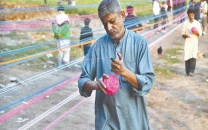Breast cancer: 25% of cases occur in women below 40
Dearth of quality screening for breast cancer in Pakistan

PHOTO: REUTERS
High mortality rates from breast cancer in developing countries are largely due to women presenting with late-stage disease resulting in worse outcomes. Delayed presentation coupled with limited capacity for correct diagnosis and lack of adequate therapy further adds to the adverse outcomes in the developing world.
Annual screening mammography is routinely and widely used in the developed world. This test is an important tool for early detection of breast cancer, before cancer has actually had a chance to grow and form a large feel able lump. By detecting cancer in its infancy, mammography certainly plays an important role in saving lives.
However, a mammogram as an early detection tool is useful only if performed on quality machines and interpreted by well-trained personnel. In Pakistan, there is a dearth of such and therefore only those with means have access to quality screening. There are currently, multiple training programs across the country and there is hope, that in times to come this scenario will change and we too, like the west will be able to practice quality and effective screening in times to come.
Until we are able to have well-trained personnel and machines available to every Pakistani woman, Breast Self-Examination (BSE) performed by the patient, in conjunction with Clinical Breast Examination (CBE) done by a health care provider, may lead to earlier recognition of a breast problem and thus may lead to early medical intervention.
The prognosis or outcome of breast cancer is largely dependent on the stage of the disease, i.e. the smaller the tumour, the lesser the procedure/treatment necessary, lesser the cost of treatment and better the outcome and survival. It is very important to understand that Breast cancer causes symptoms, such as a lump, skin changes or nipple discharge only in its more advanced form. Early breast cancer is silent. Neglecting a lump or a delay in seeking care may allow the problem to get to a stage where treatment may not be as effective.
There are lots of myths about breast cancer that must be dispelled. The facts are:
- Breast cancer occurs more commonly in women however, men can also be affected.
- Only 10-30% of breast cancer patients have a family history. Most breast cancer patients may be the first ones in their family to be affected by the disease.
- Maintaining a healthy lifestyle is good to decrease the risk of all diseases and breastfeeding is good for the baby as well as the mother. However, women may be diagnosed with Breast cancer despite a healthy lifestyle and even after having nursed their babies.
- Early diagnosis is the key to a good outcome in breast cancer. Our study from AKUH revealed that more than half of our patients present with advanced disease (stages 3 and 4), while in the US only 20% present late and thus have better outcomes.
- Performing a needle biopsy for diagnosis does not spread the disease.
- Breast cancer is not contagious.
- Breast pain is rarely due to breast cancer.
- Breast cancer may occur even in young women. Our study from AKUH reported, that 25% of breast cancers occurred in women under age 40.
- Majority of breast lumps are NOT cancer, but ALL lumps must be evaluated by a trained professional.
Early detection of breast cancer entails identifying both, the symptomatic tumors that are easily detectable on clinical exam, as well as the asymptomatic ones for which a “Screening” program using mammography may be necessary. If tumors can be detected early, the outcomes are significantly better and treatment tends to be less extensive with fewer side effects and thus a lesser burden in terms of lives lost, financial burden and time lost.
Early Treatment of breast cancer warrants that:
- Women seek medical care without delay, if they identify a breast problem.
- Women are allowed by family members to seek care,
- That they have access to care, and
- Appropriate treatment is available.
Recommendations:
- Do not ignore any changes in the breast skin or nipple, a lump in the breast or nipple discharge that occurs without squeezing the nipple. Seek medical care without delay.
- If you do not have any symptoms in your breast and are at least 40 years old and have access to mammography, please obtain a screening mammogram.
Disclaimer: This article is not a substitute for medical advice.
Dr Abida K Sattar (MD, FACS) is the Chief of Breast Surgery and a Consultant Breast Cancer Surgeon at the Aga Khan University. She is also a diplomate at the American Board of Surgery and director at the Comprehensive Breast Surgery Programme.



















COMMENTS
Comments are moderated and generally will be posted if they are on-topic and not abusive.
For more information, please see our Comments FAQ